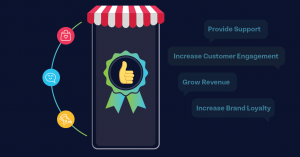
Understanding AI in business
Making use of artificial intelligence (AI) is very likely a positive move for your company. If you do it the right way, that is. Understanding machine learning and applications of artificial intelligence can be tricky and, without any doubt, there’s a right way and a wrong way to deal with these new technologies. Do it right and you’ll gain loyal customers for life, do it wrong and you’ve just lost those potential sources of revenue for your business.
One of the biggest issues that consumers have with AI is that they don’t understand how it reaches its decision. It’s not an easy concept for the human brain to grasp.
Writing for Forbes, digital transformation consultant Jason Bloomberg calls this the "black box" problem – "if people don’t know how AI comes up with its decisions, they won’t trust it". To begin to combat this, the US Department of Defense is spending some of its dollars in Explainable AI (XAI), Bloomberg says. Understanding machine learning and AI is especially important for future warfighters. With lives at stake, they need to understand and trust why the systems they are using recommend a certain action.
“Resolving today’s trust issues is important, but there are trust issues in the future as well. If we place the growing field of XAI into the dystopian future that some AI skeptics layout, we may have a path to preventing such nightmares,” says Bloomberg.
It’s become a popular Hollywood storytelling-trope that the “evil” AI will break free from its creators, causing chaos. That’s probably why everyone in the real world is so apprehensive of it.
Concludes Bloomberg: “If those creators built explainability into such systems, however, then running amuck would be much less likely – or at least, much easier to see coming. Thanks to XAI, therefore, we can all breathe a sigh of relief.”
Aside from not trusting it, there are many people who think that AI technology is just plain creepy. They think it’s spying on them and is out to steal their jobs. In fact, a recent study by US-based company Interactions found that AI can sometimes get a little too personal. Some 2 000 adults across the US were surveyed about their attitude toward AI.
Most people find AI to be creepy when:
It knows who we are (we don’t know for sure, sometimes!).
It knows our home address and who we live with (something our mom might not know!).
It knows details about our finances and medical history (we don’t even want to know!).
But there were times when people preferred to deal with AI and machine learning. These times included:
When it can solve an issue quickly.
When it uses past purchase information to assist you with a transaction.
When discussing financial information, while in a bad mood, or when trying to negotiate a discount.
It’s clear that when it comes to understanding machine learning and AI that there is a line. Your company must understand what your customers’ line is and doesn’t cross it. Here are some tips for how your company can make use of AI systems and other applications of artificial intelligence:
Do use the information provided by your customer.
Do inform customers that they're dealing with an AI.
Don’t use the information provided by third parties.
To conclude, the Interactions study said: “When executed properly, AI can be a powerhouse for businesses and consumers alike. But follow a few simple best practices to make sure you’re doing all you can to help your customers, not scare them away.
“Overall, transparency is key when it comes to AI. Customers want to know that they can trust your brand and know that you won’t abuse their personal information for your company’s benefit. Data and AI are a powerful combination, but like any technology, everyone needs to be thoughtful in how it’s applied so it’s helpful and never creepy.”
It’s clear that understanding machine learning algorithms and applications of artificial intelligence will help us all to properly accept its growing role in our lives and how it can be effectively utilized by the business. To continue learning and understanding, read our recent article. It explains how we’re all already making use of applications of artificial intelligence and chatbots in our daily lives. It goes on to discuss why these technologies need to be a part of your business’ CRM strategy.
Explore other articles
Step into the future of business messaging.
SMS and two-way channels, automation, call center integration, payments - do it all with Clickatell's Chat Commerce platform.








